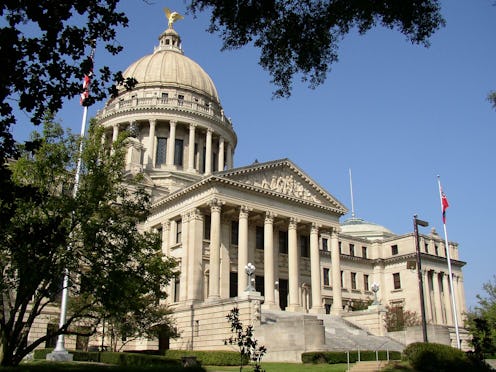News
Mississippi Is Close to Enacting A Law Legalizing Discrimination

After a federal court ruling on Thursday, a Mississippi law that LGBTQ advocates call one of the most discriminatory pieces of legislation in the country may soon take effect. "This law — now the most discriminatory, anti-LGBTQ state law in the country — was rooted in hate, it targets the LGBTQ community and it is a deliberate attempt to undermine marriage equality and the dignity of LGBTQ Mississippians who lawmakers have sworn to serve and protect," said Rob Hill, the Human Rights Campaign's Mississippi state director, in a statement.
The law, known as House Bill 1523 or HB 1523, claims to protect Mississippians' religious liberty by codifying religious beliefs such as “marriage is or should be recognized as the union of one man and one woman” and that “male (man) or female (woman) refer to an individual’s immutable biological sex as objectively determined by anatomy and genetics at time of birth.”
The enactment of HB 1523 was stayed by a federal court shortly after it was signed by Gov. Phil Bryant in April 2016. This injunction, however, was lifted last week after the case had been reviewed by federal judges of Fifth Circuit. "Under this current record, the plaintiffs have not shown an injury-in-fact caused by HB 1523 that would empower the district court or this court to rule on its constitutionality," wrote Judge Jerry E. Smith. Bryant celebrated the ruling in a statement: "As I have said all along, the legislation is not meant to discriminate against anyone, but simply prevents government interference with the constitutional right to exercise sincerely held religious beliefs."
“There isn’t a law comparable to Mississippi's HB 1523 anywhere in the country," Harper Jean Tobin, director of policy at the National Center for Transgender Equality, said in a statement. "Each state that considered similar bills ultimately rejected them for a simple, painful truth: it would issue a state-sanctioned, sweeping license for anyone to discriminate against LGBTQ people, under a paper-thin guise of religious freedom."
Advocates point out how HB 1523 could cause LGBTQ people to face more difficulties in many aspects of daily life. "LGBTQ people in Mississippi learned that they could be wrongly fired from their jobs, denied housing, and refused services at businesses just because someone wanted to use their so-called ‘religious exemption’ to discriminate against them," said GLAAD president and CEO Sarah Kate Ellis in a statement.
Whether or not the law does go into effect depends on whether the Fifth Circuit decides to hear the plaintiff side's request for a review en banc — calling the entire bench of judges rather than just a select panel. The plaintiffs also have the option to appeal to the Supreme Court.
Nonetheless, advocates believe that in the long term, HB 1523 will be struck down. "Long-term momentum is on our side and the majority of Americans now oppose anti-LGBTQ discriminatory laws like HB 1523," Ellis said. "It’s time that anti-LGBTQ elected officials in Mississippi listen to the people they represent rather than be remembered for being on the wrong side of history.”